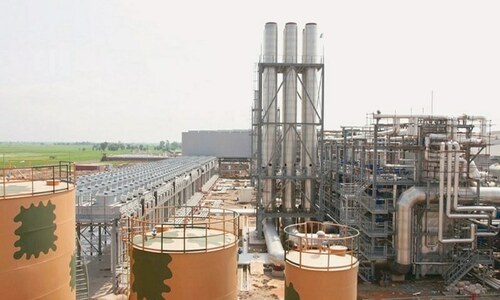ISLAMABAD: The Water and Power Development Authority (Wapda) announced on Thursday that the 969-megawatt Neelum-Jhelum Hydropower Project, valued at over Rs500 billion, has been completely shut down for inspection.
The decision follows a major operational issue detected a month ago, leading to significant pressure fluctuations in the project’s headrace tunnel, Wapda said in a statement.
It said that a comprehensive plan would be chalked out in coordination with project consultants and international experts to undertake remedial works to rectify the issue once the problem is traced.
A sudden change in the headrace tunnel pressure was observed on April 2. As per the consultants’ advice for the tunnel’s safety, the project management started operating the plant at a restricted generation of 530MW on April 6 to monitor fluctuation in the headrace tunnel pressure.
Move follows major operational issue detected month ago, leading to pressure drop in a tunnel of Neelum-Jhelum project
The plant, located in Azad Jammu and Kashmir, continued to operate smoothly at this reduced capacity until April 29, when further instability in the tunnel pressure necessitated a gradual reduction in power generation.
At around 11pm on April 29, “further change in the headrace tunnel pressure was observed. Subsequently, the generation was gradually reduced, but the pressure could not sustain within the safe limits as per the advice of the project consultants”, Wapda said.
Therefore, keeping in view the safety of the headrace tunnel and the powerhouse, the plant was thus shut down at 6am on May 1 for physical inspection of the tunnel to identify the problem leading to reduced pressure.
Based on the detailed discussion with consultants regarding dewatering the 48km-long tunnel, the intake gates at the dam site were lowered for the flushing of de-sanders. Dewatering started from the powerhouse side on the same day and will be executed at intervals to ensure the tunnel’s safety.
Wapda said the project had a 51.5km tunnel system constructed in a weak geological and seismic-prone area. Its headrace tunnel is 48km long, while the tailrace tunnel is 3.5km long. About 90pc of the project is underground.
The project was earlier closed completely in July 2022 due to major cracks in its 3.5km tailrace tunnel, which were repaired over the next 13 months. Power generation started again in August-September 2023, attaining its maximum capacity of 969MW on March 28, according to Wapda.
Within a week, on April 2, the headrace tunnel’s pressure dropped and power production fell to about 400MW “soon after the project was restored to full capacity by international contractors because of debris or cracks in the headrace tunnel”, inside sources told Dawn.
They said the project authorities and contractors, in consultation with Wapda’s management, tried in-house emergency measures to restore the project, but the job was greater than anticipated.
The authorities did not disclose the fault even to the government until Dawn sought confirmation of the incident, which led to a drop in the tailrace tunnel pressure. On April 14, however, it was confirmed that generation from the plant had been curtained due to reduced tailrace tunnel pressure as a precautionary measure to observe the behaviour of pressure fluctuation.
Previous repairs of the tailrace tunnel cost the nation about Rs6bn in addition to about Rs37bn in energy loss during repairs, maintenance and testing over the following 20 months. Wapda has filed about Rs43bn insurance claims for the losses and is reported to have already held a series of high-level meetings on the subject.
Since its commissioning in 2018, the Neelum-Jhelum Hydropower Project has so far generated 19.83bn billion units of electricity, including 1.54bn units since the resumption of electricity generation after the rehabilitation of the tailrace tunnel in August last year.
The project’s construction began in 2002 after a 21-year delay and was completed in April 2018 — with repeated cost overruns and missed deadlines.
The China Gezhouba Group Corporation (CGGC), which was hired in December 2007, performed major construction work, involving about 58 km of tunnels.
Published in Dawn, May 3rd, 2024














































Dear visitor, the comments section is undergoing an overhaul and will return soon.